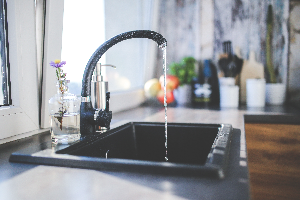What’s That Smell? When Water Stinks and What You Can Do About It
When you turn on the tap, you expect the water coming out to be clean, fresh, and perfectly drinkable. So when water smells terrible, you have every cause to be concerned.
Some smells, while offensive, are not so harmful to your water quality, even if the taste is affected. Others can indicate a serious problem. Here’s are common water odors and what you can do about them.

Rotten Eggs
One of the most common odors in home water supplies is rotten eggs. The smell is actually sulfur, and it can have a number of causes. The main reasons for a sulfurous odor include:
- Bacterial growth in one of your plumbing components. Sometimes, your whole water supply is not affected. If only your bath water or heated water smells bad, it’s a sign that there’s bacteria in your water heater. Bacteria can also grow in the pipes, giving off an egg-like or sewer-like smell when you run your water. Contact a plumber to repair your heater.
- Bacteria in your drain. The smell may not be coming from your running water at all, but from your drain. Food, hair, and other organic matter can build up, and it makes prime breeding ground for bacteria. You might think your water smells when it is really your drain that is the problem. Flushing the drain helps to solve the issue.
- Bacteria growing in well water. If you have a well, shocking the well periodically helps to prevent the growth of harmful bacteria. If your well water did not stink before and does now, stop drinking your well water until it can be tested. Some bacteria is harmless, but you can’t know for sure if your water is safe until it is tested.
Sometimes, well water will still smell like sulfur even after it is properly shocked. Low levels of sulfate in the water can continue to make water smell eggy, and the well provides a home for sulfur oxidizing bacteria. However, besides a slight laxative effect, there is not a risk to your health.
On the other hand, hydrogen sulfide, which also produces the rotten egg smell, is poisonous. It is not usually damaging unless heavily concentrated, except when the contamination is from farm waste or sewage systems.
To be on the safe side, you should always get eggy-smelling well water tested for health reasons. You can treat with whole house filtration to remove bacteria and reduce sulfate and sulfide levels.
Petroleum or Gas
Does your water smell like a gas station when you turn on the tap? Water that smells like fuel is a serious issue, as it usually indicates that your water supply has been contaminated with some type of fossil fuel. Sources of contamination might be a burst underground fuel tank, leeching from a nearby industrial plant or farm, or a leaking fuel supply line.
Report the issue to your county utilities office immediately. Other homes or even an entire town could be affected by this type of contamination.
As soon as you notice any fuel-like smell, stop drinking your water until you can ensure it is safe. After you’ve discovered the source of contamination, contact a local water treatment company to install an activated carbon filter to remove any lingering chemical contaminants.
Fish or Soil
Going to the lake can be a great summer day-trip, but it’s not so great when the lake seems to be coming from your faucet. Water smells like fish or dirt (similar to a lake) when you have well water contamination from surface run-off. Reservoirs, pressure tanks, or any other water storage container can have increased organic matter that decays and causes the fishy smell.
You can easily remedy this problem by chlorine shocking the well. If the problem continues after shocking, you’ll need to speak with a water treatment professional about installing a system chlorinator.
The system chlorinator will treat all water from your well with chlorine to kill bacteria. The water then runs through a large activated carbon filter to remove the chlorine and any particulates. Your water should smell and taste perfectly clean.
Other causes of soil or fish-smelling include:
- Changes to the water supply, such as algae blooms in the summer time
- The presence of heavy metals, which should be monitored by your local water treatment center
- Use of a chemical called chloramine to flush the system, which temporarily causes an organic smell and taste
Contact a professional to find out what’s behind your smelly water supply.
Bleach
People with wells are not the only ones who deal with odorous water. Some who rely on municipal water treatment also struggle with the smell of bleach when running water. Chlorine is used to treat public water supply, and the smell (and taste) can be unpleasant especially if concentrations are higher, even though they are still within the legal and safe limit.
You can install a home water filtration system that will remove added chlorine from your water if the smell and taste is consistently stronger than you would like. However, if you notice a strong bleach smell, like a swimming pool, you should contact your local public water supply. There could be something wrong.
If you have a well, the bleach smell can come after shocking your well. Running your water will flush the chlorine out of your water supply.
For more information on water odors and what you can do about them, contact us at Johnson Water Conditioning.

 Better Water for
a Better Life
Better Water for
a Better Life
